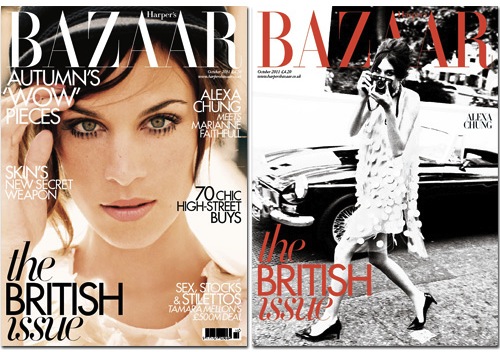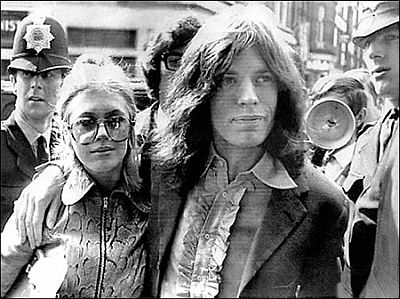With her piece for the latest issue of Harper’s Bazaar UK, Alexa Chung adds print journalist and interviewer to her already extensive résumé. Harpers heralds Chung as a “muse, designer, model, DJ and TV presenter” – a job title as long as it is meaningless. Why the UK-based magazine even has a “British issue” is beyond me, but Chung has been chosen as the issue’s cover girl as she “epitomes a uniquely British style.” Her assignment for Harpers was to interview three female icons from the 1960s; Penelope Tree, Marianne Faithfull and Pattie Boyd. These short interviews, only six questions each, appeared alongside a profile of Chung conducted by journalist Stephanie Rafanelli. In contrast to the Q & A style of Chung’s interviews, Rafanelli’s piece was longer with the dialogue interspersed throughout the feature.
Chung’s opening question to Penelope Tree set the tone for all three interviews; an unusual ramble, more of a recounting of facts than an actual question. “You were born in England, but moved to New York when you were very young. Your mum was a prolific socialite and you were left to your own devices.” I’m sure Tree is aware of these facts and does not need them reiterated to her. Chung’s concern that the readers of Harpers may not be aware of Tree’s life story is justified, but this information would be a lot more suitable in an introduction before the article than embedded in the question.
Her first question to Pattie Boyd was almost as belabored “You were discovered as a model in 1962, while you were shampooing at Elizabeth Arden. Then you modeled for Mary Quant. What was it like?” Chung then quickly half-answers this question herself by adding “There must have been a real buzz.”, leaving Boyd with nothing much to do but agree with the statement. This was quickly followed second, almost identical question “what was your most iconic memory?” Chung has a habit, perhaps due to nervousness, of asking duplicates of basically the same question. During Pattie Boyd she asks “what struck you about him?” followed directly by “what was going through your mind?”
She also seems insecure about the strength of her own questions, cramming them with Sixties references and choosing questions to include several in the each. This usually leaves the interviewees confused about what to address first. As each interview progresses, Chung’s questions become shorter and less belabored but the interviews rarely have a conversational quality. The only narrative structure I could find is that they are ordered somewhat chronologically. I postulate that if the order of questions were reorganized, the interviews would still feel very similar.
During her interview, Penelope Tree recalls how during her time at a strict boarding school in Massachusetts she began planning to escape to London. As a reader, your natural reaction is to wonder how she managed this, but Chung never follows up with her. This is very dissatisfying. You get the sense that she, for whatever reason, doesn’t want to veer far from her prepared script.
Her interview with Marianne Faithfull is the exception. Most questions are derived from Faithfull’s previous answers therefore the interview feels more like a natural conversation. But despite their rapport, her questions remain depthless and Faithfull’s post-Sixties struggles are never alluded to. In her own interview, Chung is adamant that “the girls in the Sixties were never over-shadowed by the men they dated.” Yet ironically, while interviewing these women, she spends half the time asking them about their love affairs. She never asks Maryanne Faithfull her about her own music career, opting instead for questions about her ex-husbands Mick Jagger and artist John Bundar.
As a more experienced interviewer, Rafanelli managed to get some revealing quotes from Chung, including her resentment towards members of the public stealing her Sixties style: “Everyone copied my soading coat.” There is a mysticism surrounding the Swinging Sixties in London, one that Chung certainly buys into. She contemplates how she has always been “attracted to the groupie vibe” Her use of the word vibe is interesting here since during her interviews, she seemed far more concerned with the idea of the Sixties and the styles of these women than their actual experiences. She understands very little about actual place of women then and fails remember that these “women” were in fact incredibly young, often in their late teens.
Harper’s describe Chung as a “reincarnation” of these Sixties icons. An interview is a conversation with a purpose, and the purpose here seems to be to lend creditability to Chung by associating her with this bohemian past. Her constant references and borderline obsession with dates are used more to prove her knowledge of this period, than actually contribute anything to the interviews. What results are questions crammed full of facts, but interviews of little actual substance.



